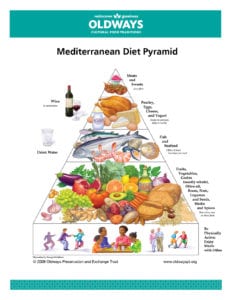
Take your tastebuds on a Hawaiian Vacation
Summer just got here, and this heat already has us dreaming of a sweet island getaway. That’s why this month we turned to the beautiful
Cart
No products in the cart.
NEW YEAR SALE ENDS IN
Spend $130, Save $15. Spend $170, Save $20. Spend $200, Save $30.

This month we have introduced a hint of summer with our Mediterranean Roasted Chicken. You may have heard of ‘The Mediterranean Diet’ but what is it? The Mediterranean diet is a way of eating based on the traditional cuisine of countries bordering the Mediterranean Sea. While there is no single definition of the Mediterranean diet, it is typically high in vegetables, fruits, whole grains, beans, nut and seeds, and olive oil. How come it has become so popular and what are its benefits?

This biogeographical region includes the Mediterranean Sea and seven Member States, either partially (France, Portugal, Italy, Spain) or completely (Greece, Malta, Cyprus). It has specific regional features: a climate of hot dry summers and humid, cool winters and a generally hilly landscape. The overarching characteristics of Mediterranean cuisine are largely shaped by the climate and geography of the region. For instance the sunny, mild Mediterranean climate yields an agricultural bounty that heavily influences the vegetable-dominant cuisines of the region. Key ingredients of Mediterranean cuisine include olive oil, fresh fruits and vegetables, protein-rich legumes, fish and whole grains with moderate amounts of wine and red meat.

A Mediterranean diet incorporates the traditional healthy living habits of people from countries bordering the Mediterranean Sea, including France, Greece, Italy and Spain. The main components of Mediterranean diet include:
Other important elements of the Mediterranean diet are sharing meals with family and friends, enjoying a glass of red wine and being physically active.
The Mediterranean diet is one of the healthy eating plans recommended by the Dietary Guidelines for Americans to promote health and prevent chronic disease. It is also recognized by the World Health Organization as a healthy and sustainable dietary pattern and as an intangible cultural asset by the United National Educational, Scientific and Cultural Organization.

The discovery of the health benefits of the Mediterranean Diet is attributed to the American scientist Ancel Keys of the University of Minnesota School of Power, who pointed out the correlation between cardiovascular disease and diet for the first time. Dr. Ancel Keys and his colleagues were the first to discover that the Mediterranean diet has health benefits for a wide range of diseases. During the early 1950s and late 1960s, while Keys was investigating his hypothesis, the Mediterranean region was recovering from the effects of World War II but was not yet influenced by the rising trend of fast food. Keys formed his hypothesis from his simple observation that the people of the island Crete were in especially good health, largely due to their dietary habits.
Research into the traditional Mediterranean diet has shown it may reduce a number of risks. These include developing conditions like type 2 diabetes, high blood pressure and high cholesterol, which are all risk factors for heart disease. Researchers have also found that people who closely follow a Mediterranean diet may live a longer life and be less likely to put on weight.
In 1993 Oldways (a food and nutrition non-profit) created the Mediterranean Diet Pyramid in partnership with the Harvard School of Public Health and the WHO. Subsequently it replaced the USDA’s original food pyramid as a healthier version. Today, the Mediterranean Diet is more popular than ever, with new research every month documenting its benefits. Starting at the base of the pyramid, you’ll find:


Interested in trying the Mediterranean diet? Here are seven easy steps recommended by the Harvard Medical School to incorporate its basic principles into your meals:
Dispense with the idea that all fats are bad for you. In fact, olive oil and other unsaturated fats are an integral part of this heart-healthy diet. When you sauté foods, coat your pan with olive oil instead of butter. Drizzle olive oil on your vegetables and fish before baking, and mix it into your salad dressings. Use “extra virgin” or “virgin” olive oil, because it’s the least processed type.
A handful of walnuts or almonds will keep you full between meals and supply you with even more healthy unsaturated fat. Just avoid heavily salted or sweetened nut varieties.
At each meal, make at least half of your plate fruits and vegetables. Include a variety of colors, for example, green (spinach, broccoli, kale, Brussels sprouts), orange (sweet potatoes, carrots, oranges), red (red pepper, tomatoes, strawberries), and purple (eggplant, beets, grapes). If you’re a reluctant vegetable eater, get creative. Sprinkle breadcrumbs on your eggplant before baking it, or drizzle olive oil over asparagus before roasting.
Twice a week, replace the meat in your meal with fish. Fish is high in heart- and brain-healthy omega-3 fatty acids, and it’s more versatile than you might think. You can grill it, bake it, sauté it, or broil it. You can even chop it up and eat it between two slices of whole-grain bread. Look for fish varieties that are high in omega-3s but low in mercury. Examples might include salmon, sardines, canned light tuna, and tilapia.
The Mediterranean diet emphasizes “whole” foods like cheese, yogurt, fish, grapes, and chicken. Additionally, foods should be as unadulterated as possible, meaning minimal added salt, sugar, and chemicals. Ideally, fruits and vegetables should also be at the peak of season (for example, buy apples in fall and oranges in winter). Leave cookies, crackers, potato chips, and other heavily processed boxed and bagged foods on the grocery store shelf—particularly if you can’t pronounce half of the ingredients.
You don’t have to give up dessert but you can make it better for you. Melt a little dark chocolate (containing more than 70% cocoa) over a dish of raspberries or strawberries for a decadent dessert you don’t have to feel guilty about.
Provided your doctor says it’s safe for you to drink, enjoy a glass of wine with dinner because there is evidence that red wine is heart protective. But don’t ask for a refill since drinking more than a glass or two daily could increase your risk for cancer or a stroke.
Why don’t you head over to Flavorly and try our Mediterranean Roasted Chicken? You might also like to try our chicken Piccata and Caprese Steak.
https://oldwayspt.org/traditional-diets/mediterranean-diet
https://www.health.harvard.edu/heart-health/why-the-mediterranean-diet-is-so-good-for-your-heart
https://tableagent.com/article/an-introduction-to-mediterranean-cuisine/

Summer just got here, and this heat already has us dreaming of a sweet island getaway. That’s why this month we turned to the beautiful

Check out how EatFlavorly utilizes Mexican meats and so many more in our scratch-made meals over at Our Menu! With Cinco de Mayo

National Earth day is approaching on Thursday April 22nd. Today, not only is Earth Day a day meant to increase awareness of environmental problems, but
The convenience of home meal delivery is undeniable. Getting food delivered to your door that does not require cooking or cleaning is a huge time-saver.